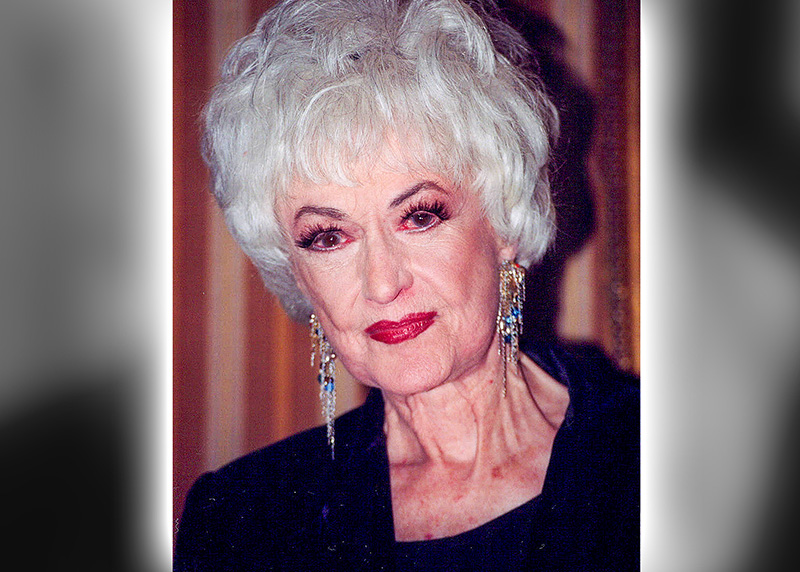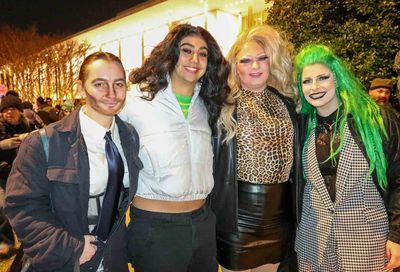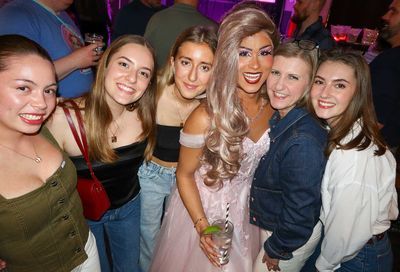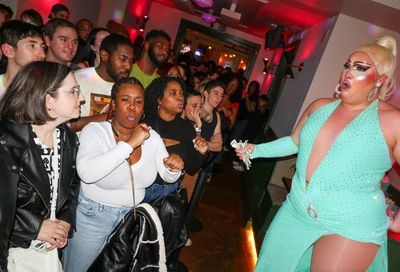U.S. Supreme Court declines appeal from Washington florist who refused to serve gay couple
Refusal to hear case means lower court decision finding Arlene's Flowers guilty of violating the Washington Law Against Discrimination stands.
By John Riley on July 2, 2021 @JRileyMW

On Friday, the U.S. Supreme Court refused to hear a case involving Washington State florist who was accused of violating the state’s nondiscrimination law when she refused to provide flowers for a same-sex couple’s wedding.
The high court refused to grant certiorari, which would allow lawyers for the flower shop owner to argue that anti-discrimination laws prohibiting discrimination based on sexual orientation or gender identity violate the First Amendment rights of those with sincerely held beliefs opposing homosexuality or same-sex marriage. Notably, Justices Thomas, Alito, and Gorsuch indicated they would have voted to hear the case
By passing on the issue, the high court allows the lower court’s decision, in favor of the gay couple denied service, to stand.
Robert Ingersoll and Curt Freed brought the case after being denied flowers for their wedding in 2013, alleging that the proprietor of the Richland-based flower shop Arlene’s Flowers, Barronelle Stutzman, violated the Washington Law Against Discrimination, which prohibits discrimination based on a number of characteristics, including sexual orientation.
Stutzman has claimed that her religious beliefs opposing homosexuality and same-sex marriage prohibit her from providing goods or services that could be used in a same-sex wedding. After first refusing to settle the case for $2,000, and then losing at the district court level, she and her lawyers appealed the case to the Washington State Supreme Court, which unanimously found that the florist had violated the Washington Law Against Discrimination, and that providing equal service to all customers did not violate her constitutional rights.
Stutzman’s lawyers then appealed the case to the U.S. Supreme Court, which remanded the case back to the Washington State Supreme Court for reconsideration, in case the decision might have been clouded by anti-religious bias. The high court had previously found, in a similar case, known as the Masterpiece Cakeshop case, that the Colorado Civil Rights Commission may have acted in a prejudicial manner against a Colorado baker who was found to have violated the state’s nondiscrimination law when he refused to provide a wedding cake for same-sex wedding.
But in 2019, the Washington State Supreme Court stood by its earlier decision, finding, once again, that Stutzman had violated the law and finding no evidence of any animus toward religion in general nor towards Stutzman’s personal beliefs. The court also rejected Stutzman’s claims that the law violates her First Amendment Rights and that lawmakers should carve out a religious exemption in the law.
See also: Washington florist who refused service to gays appeals to U.S. Supreme Court
“Stutzman contends that there is no reason to enforce the WLAD when, as she puts it, ‘[N]o access problem exists.’ We emphatically reject this argument,” the court wrote at the time. “We agree with Ingersoll and Freed that ‘[t]his case is no more about access to flowers than civil rights cases in the 1960s were about access to sandwiches.’
“As every other court to address the question has concluded, public accommodations laws do not simply guarantee access to goods or services. Instead, they serve a broader societal purpose: eradicating barriers to the equal treatment of all citizens in the commercial marketplace,” the decision reads. “Were we to carve out a patchwork of exceptions for ostensibly justified discrimination, that purpose would be fatally undermined.”
Stutzman’s lawyers then appealed the case back up to the Supreme Court once more, resulting in Friday’s decision.

“Today, the Supreme Court confirmed that LBGTQ people should receive equal service when they walk into a store,” Ria Tabacco Mar, a lawyer with the American Civil Liberties Union, which represented Ingersoll and Freed, said in a statement. “Planning a wedding was a joyful time for Rob and Curt until they were refused service at their local flower shop.
“No one should walk into a store and have to wonder whether they will be turned away because of who they are. Preventing that kind of humiliation and hurt is exactly why we have nondiscrimination laws,” Mar added. “Yet 60 percent of states still don’t have express protections for LGBTQ people like the kind in Washington State. Our work isn’t over yet.”
“After Curt and I were turned away from our local flower shop, we cancelled the plans for our dream wedding because we were afraid it would happen again,” Ingersoll added in his own statement. “We had a small ceremony at home instead. We hope this decision sends a message to other LGBTQ people that no one should have to experience the hurt that we did.”
The Human Rights Campaign praised the high court’s decision not to hear the case, and said the decision opens the door for Congress to cement legal protections for LGBTQ people by passing the Equality Act, a landmark law that, if passed, would prohibit discrimination based on a person’s sexual orientation or gender identity in various facets of life.
“By denying certiorari in Ingersoll & Freed v. Arlene’s Flowers, Inc., the Supreme Court has once again said that critical nondiscrimination laws protecting LGBTQ people are legally enforceable and has set a strong and definitive precedent,” Alphonso David, the president of the Human Rights Campaign, said in a statement. “Now, we need these protections for the LGBTQ community, and all people, across the country, and in every walk of life. … The Court has validated nondiscrimination protections, now Congress must follow suit.”
See also:
13-year-old girl sues Florida over bill barring transgender athletes from female sports teams
Caitlyn Jenner wants to move homeless people to “big, open fields”
Transgender woman sues hotel chain for firing her for wearing women’s clothes to work
Bea Arthur’s Air Force Bio Purged by Department of Defense
The DOD removed a page on actress Bea Arthur's military service to purge references to diversity and LGBTQ content.
By John Riley on March 27, 2025 @JRileyMW
A page touting Golden Girls actress Bea Arthur's military service during World War II was reportedly scrubbed from the U.S. Department of Defense website as part of the Trump administration's overzealous efforts to purge anything related to diversity or LGBTQ identity.
Last week, X user @swiftillery noted that the article on Arthur -- first published in October 2021 -- had been removed from the Defense Department website.
According to The Advocate, the Internet Archive documented a "404 -- Page Not Found" message at the URL where the article had been housed.
Cincinnati Pride Cuts Ties With Several Corporate Sponsors
The LGBTQ organization wants to partner only with corporations that demonstrate regular support for the LGBTQ community and respect for DEI.
By John Riley on March 25, 2025 @JRileyMW
Cincinnati Pride announced it will cut ties with several corporate sponsors, sacrificing tens of thousands of dollars, in response to the companies' decisions to eliminate diversity, equity, and inclusion (DEI) policies and initiatives.
The organization acknowledged that it would be a struggle to replace the funding for its annual Pride parade. But it has also said it is essential to stand by its values, which include respect for the history and diverse culture of the LGBTQ community.
Cincinnati Pride says it doesn't want to work with corporate sponsors that are viewed as hostile to those values and would rather work with companies that have demonstrated a genuine, ongoing commitment to LGBTQ causes throughout the calendar year, according to Cincinnati NBC affiliate WLWT.
A Second Judge Blocks Trump’s Anti-Trans Health Care Orders
A Maryland judge finds that transgender plaintiffs and their families are likely to succeed in proving the orders are unconstitutional.
By John Riley on March 5, 2025 @JRileyMW
A federal judge issued a nationwide order blocking a pair of executive orders from President Donald Trump seeking to criminalize the provision of gender-affirming health care to transgender youth.
U.S. District Judge Brendan Hurson, of the District of Maryland, granted a preliminary injunction to the families of several transgender young adults and adolescents whose access to gender-affirming care was disrupted by Trump's orders. Those families are joined by the pro-LGBTQ advocacy group PFLAG National and GLMA, the country's largest organization of LGBTQ and allied health professionals.
Support Metro Weekly’s Journalism
These are challenging times for news organizations. And yet it’s crucial we stay active and provide vital resources and information to both our local readers and the world. So won’t you please take a moment and consider supporting Metro Weekly with a membership? For as little as $5 a month, you can help ensure Metro Weekly magazine and MetroWeekly.com remain free, viable resources as we provide the best, most diverse, culturally-resonant LGBTQ coverage in both the D.C. region and around the world. Memberships come with exclusive perks and discounts, your own personal digital delivery of each week’s magazine (and an archive), access to our Member's Lounge when it launches this fall, and exclusive members-only items like Metro Weekly Membership Mugs and Tote Bags! Check out all our membership levels here and please join us today!
The Magazine
-
Most Popular
 'Porn Star University' Started by Gay-for-Pay Creator Andy Lee
'Porn Star University' Started by Gay-for-Pay Creator Andy Lee  Win Tickets to Awesome Con!
Win Tickets to Awesome Con!  Anheuser-Busch Abruptly Ends Sponsorship of St. Louis PrideFest
Anheuser-Busch Abruptly Ends Sponsorship of St. Louis PrideFest  Awesome Con Celebrates the Geek in All of Us
Awesome Con Celebrates the Geek in All of Us  The Commanding Style of Nathan Lee Graham
The Commanding Style of Nathan Lee Graham  Film: Spring Arts Preview 2025
Film: Spring Arts Preview 2025  Montana Governor Signs Anti-Trans Bills into Law
Montana Governor Signs Anti-Trans Bills into Law  Trump Targets Law Firm for Defending Transgender Rights
Trump Targets Law Firm for Defending Transgender Rights  Riki Wilchins: 'Not Passing is Now a Criminal Offense'
Riki Wilchins: 'Not Passing is Now a Criminal Offense'  Texas 'Sexual Content' Bill Would Criminalize Literary Works
Texas 'Sexual Content' Bill Would Criminalize Literary Works
 Utah Bans the Pride Flag
Utah Bans the Pride Flag  3 Million People Could Die Due to HIV Funding Cuts
3 Million People Could Die Due to HIV Funding Cuts  Celebrities Urged to Boycott Hungary Over Pride Ban
Celebrities Urged to Boycott Hungary Over Pride Ban  The Commanding Style of Nathan Lee Graham
The Commanding Style of Nathan Lee Graham  Texas 'Sexual Content' Bill Would Criminalize Literary Works
Texas 'Sexual Content' Bill Would Criminalize Literary Works  Awesome Con Celebrates the Geek in All of Us
Awesome Con Celebrates the Geek in All of Us  Win Tickets to Awesome Con!
Win Tickets to Awesome Con!  Film: Spring Arts Preview 2025
Film: Spring Arts Preview 2025  Classical & Choral Music: Spring Arts Preview 2025
Classical & Choral Music: Spring Arts Preview 2025  Broadway: Spring Arts Preview 2025
Broadway: Spring Arts Preview 2025
Scene
Metro Weekly
Washington's LGBTQ Magazine
P.O. Box 11559
Washington, DC 20008 (202) 638-6830
About Us pageFollow Us:
· Facebook
· Twitter
· Flipboard
· YouTube
· Instagram
· RSS News | RSS SceneArchives
Copyright ©2024 Jansi LLC.












You must be logged in to post a comment.